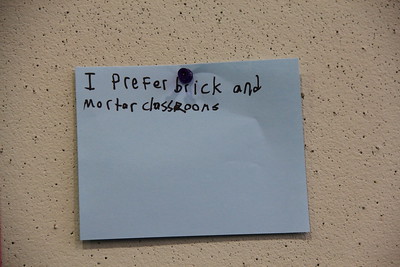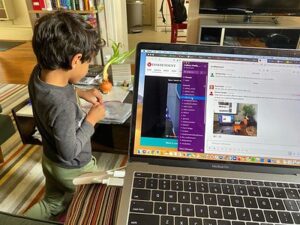Damage is a harsh word, but that’s exactly what the results of a recent survey regarding online classes during the pandemic show. The survey, sponsored by College Pulse, Inside HigherEd and Kaplan, show that most students believe they learned less in online classes. That assessment is something of a blow to college administrators hoping to enroll a raft of converts to online education.
Aside from the 52% of survey respondents who said they learned less from their online courses last year, nearly as many (47%) rated the value of their online courses as either fair or poor. Among the respondents’ chief complaints was instructors who were forced to teach online without being prepared to teach online. Some respondents indicated that professors were behind the learning curve on teaching with technology.
Other findings from the survey: 8 out of 10 online students found it difficult to concentrate during online lectures. (On a positive note, only 6 out of 10 community college students said that concentrating on online lectures was too difficult.) Surprisingly, one of the best predictors of focus problems during remote lectures was whether the student maintained his/her employment during the pandemic. Those students who remained employed had a more difficult time concentrating on online lectures. On the other hand, a recent Student Watch survey showed that students over the age of 35 were more satisfied with their online coursework.
Online classes don’t work for everyone
These factors are important to consider when making decisions about enrollment. Even after 15 months of fully online learning, most students still say that they do not want online classes. But online classes can work (well!) for the right kind of students in the right circumstances. WCC could use this as a tool to recruit older students who appreciate and value online classes.
It is important for the WCC administration to recognize that online classes don’t work for everyone. In fact, they don’t work for most students. (And apparently they don’t work for a lot of instructors, too.) Recognizing that means making in-person sections of every course available (without prejudice) every semester. It’s not just an issue of preference. Some students have learning disabilities that prevent them from succeeding in online courses. Others lack the resources necessary to succeed in online classes. Making in-person options available to all students in all classes guarantees that these students will at least have the opportunity to succeed.
I say this knowing that WCC is making all classes available in both formats this fall as an accommodation to the pandemic. Prior to the pandemic, however, a growing number of courses were being squeezed into online-only delivery. This wasn’t the result of student demand. The students have been very clear; they don’t like online classes. They would prefer to do their learning in a classroom. Growth in online classes is simply wishful thinking on the part of an administration that has grown accustomed to ignoring everyone around them.
Photo Credit: Clemson University Library, via Flickr

























